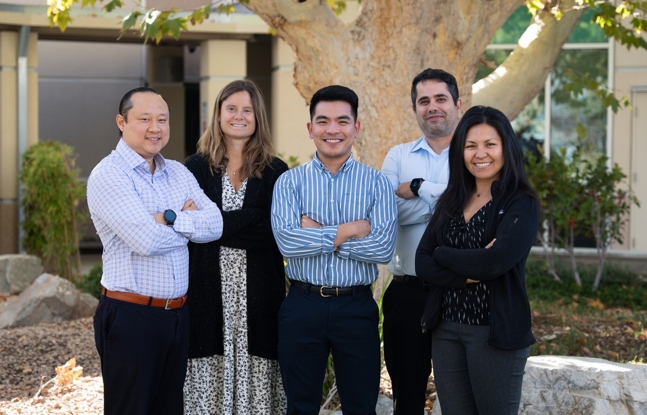Kelby falls out of training and into our hearts
- Category: News, Press Releases, Blog
- Posted On:
- Written By: Rebecca Neipp

“When one door closes, another opens; but we often look so long and so regretfully upon the closed door that we do not see the one which has opened for us.” – Alexander Graham Bell
Fortunately for the Ridgecrest Regional Hospital family, Senior Services Director Susan Bodnar didn't miss the opportunity. And thanks to her pivot, 2-year-old black labrador-retriever Kelby is now a certified therapy dog.
Bodnar is not just a multi-tasker in her role as a liaison for local senior residents in need of support, she is well-known by her colleagues and peers as a puppy trainer for Guide Dogs for the Blind. For the 16 months she had Kelby in tow, the RRH community fell in love with her.
“In fact, I've practically been thrown out of meetings when I showed up without Kelby!” said Bodnar.
However, it was revealed that Kelby had a stomach issue that would disqualify her as a Guide Dog. “I was so upset, because she's the sweetest dog and I knew that she would have made an amazing guide dog.” Bodnar's daughter-in-law came back with a proposal: have Kelby registered and certified as a Therapy Dog instead. And today, that's exactly what she is.
The principal difference between a guide dog and a therapy dog is that the former has public access rights under the Americans with Disabilities Act, thereby enabling their handlers to assist those with impairments such as vision loss with specific tasks. Therapy dogs provide comfort and emotional support to people in settings like hospitals and nursing homes.
Sandra Brown, director of community outreach at RRH, often partners with Bodnar and Kelby on their excursions. “A therapy dog is for everyone who just needs a little extra love in their lives,” she said.
“We had a recent instance at the hospital with an anxious young patient,” said Bodnar. “We were told that she loved dogs, so we brought Kelby in to sit with her during a procedure. We watched how that helped comfort her and calm her anxiety. In fact we see this often when we bring Kelby to Bella Sera.”
“She just lifts everyone's spirits,” said Brown. “People in healthcare are often dealing with extreme circumstances. When people are suffering, they are not always at their best.”
Particularly during the pandemic, the plight of front-line healthcare workers rose to greater awareness. “The cumulative pressure of dealing with crisis can also begin to tax staff,” said Brown.
“Fortunately, Kelby is very intuitive,” said Bodnar. “She knows when people are having a difficult time, and just her presence can have a very calming effect on those who are struggling.”
Kelby is now a regular at employee engagement events as well. “I have even seen our executives get up out of their chairs and lie down on the floor next to her,” said Bodnar. “I think dogs are much smarter than we give them credit for.”
“I really think this has changed the entire culture of outreach,” said Brown. “Our staff can now request 'Kuddles for Kelby,' and I also bring her to just about every community function.”
Bodnar said she understands the misconceptions around service dogs, especially when people ignore the restrictions designed to keep untrained dogs out of public spaces like grocery stores. “I only take Kelby where it is permitted, but I also keep her on a soft lead just so that I don't make anyone nervous.”
She noted that there is a tremendous need for volunteers to train service dogs. “Like in Kelby's case, sometimes there are circumstances beyond training that limit who graduates. But I have no regrets about the time I've invested. I don't think anyone in our RRH family does, either.”
.jpeg)

